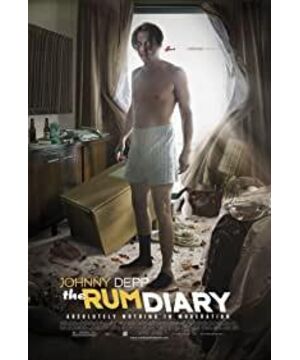The theme of the original book is the loss of the American dream and the midlife crisis of the self, and I think the latter is more important. However, the film tried its best to emphasize the previous theme, but completely stripped it from the character experience, leaving the two with almost no chemical reaction. This is especially reflected in the film's deletion of the main characters and the tampering of the relationship. superior. Originally, Thompson wanted to borrow a setting similar to "On the Road" to make the Yemeni role become Camp’s opponent, the epitome of his own youth, while Chenault is a bridge between his past and the future. Let Camp achieve the goal of gradually recognizing himself through contacts with Yemen, Chenault has become an indispensable catalyst to fully display the character of Yemen (that is, young Camp). Of course, Chenault's own unrestrainedness also pinned to a certain extent Camp's vision of an ideal partner when he was young. The manic Yemen finally abandoned Chenault, who accidentally slipped from the ideal heights-this kind of slip was sooner or later, and Camp, with an uneasy conscience and occasional disgust, eventually took her in, just like a human By the middle age, even though he was unwilling, he had to clean up the mess he had left when he was young. After all of this, the original work only sees the slightest insight, bringing out the theme of the loss of the American dream. But the film is good. Excessive force has directly turned this delicate triangle relationship into a symbol of the break between the capitalist speculators represented by Sanderson and Simborg and the bottom people such as Camp and Moberg. Completely deviated from the original meaning, and slightly exaggerated, the paragraph deliberately made Camp like Thompson himself possessed, cynically changing his own news attitude, and the last part of the so-called San Juan Daily News Fair. The dying bridges all aggravated this kind of contrition.
In addition to the unreasonable deletion and change of the original characters, the failure of the film is also reflected in the improper selection of the original plot. In the original work, although there are not many climaxes, in plain language, Thompson's anxiety about middle age and sensitivity to reality are often revealed. This is also the reason why this book has an important position in Thompson's writing career. There are a lot of solitary contemplations and observations of the external environment in the book. This kind of inner examination can best reflect Camp's growth. The most striking of these is Camp’s interpretation of San Juan’s views on where everyone lives in San Juan, which not only reflects his changes in his attitude towards life as he grows older, but also reflects his ten years of pursuit of the American dream. And the process of final failure-these his views on the house became one of the important footnotes. However, this element is almost completely ignored in the film. There is no disgust for Sara’s basement-like hut, love for Carmen’s beach house, admiration for Sanderson’s mansion, praise for the St. Thomas landscape suite, and finally The satisfaction of my own little family... It can be said that it is abandoning the roots, and avoiding the most important things. The film only mentions the plot that San Juan uses rows of hotels to deprive local residents of the natural beach and seascape in order to develop tourism, so that it is also a commentary for the evil American capitalism.
Finally, the inexplicable cockfighting, current reviews, drug use, witch doctor plots in the film, as well as Mobergy's indiscriminate replacement of Carmen's role in the film, all make the focus of the film misplaced, and it is not clear why. The only other key point in the original book is that Thompson used Camp’s desire to rely on Sanderson’s superior experience to narrate his failed journey to the so-called American dream that one day can become successful and rich. This clue is this clue. In the end, it became an inferior excuse for the screenwriter to make Camp switch to press freedom jihad.
View more about The Rum Diary reviews











